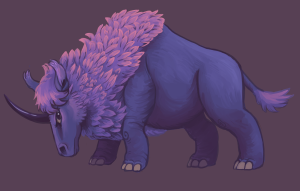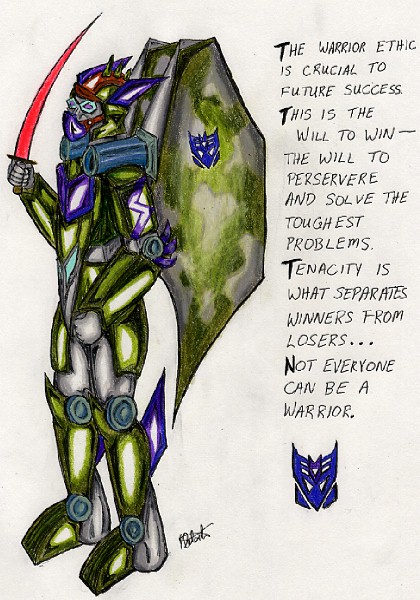 (Image of “Azazel” by Stephanie Bajema.)
(Image of “Azazel” by Stephanie Bajema.)
I remember sitting in the 2010 edition of Superstars Writing Seminars when Kevin J. Anderson gave his now-infamous professionalism example: “If you agree to write for a purple unicorn anthology, be a professional and write the best damn purple unicorn story you can, no matter how dumb you think the concept is.”
Surveys agree: most people think purple unicorns are pretty ridiculous.
But I’m a Firebringer Trilogy fan (as I wrote about back in May) and a My Little Pony fan since 1983. Purple unicorns are serious business to me. I knew I could write a purple unicorn story straight-up: no irony, no metaphor, no punchline. The challenge, to me, would be to show a reader what purple unicorns look like through my eyes.
And when the Purple Unicorn Anthology , One Horn To Rule Them All, became a reality, I had my chance. This would be a collection of short stories, the sales of which would fund scholarships for deserving future Superstars, showcasing our storytelling talents.
I played a game during my preteen and early teen years, when I went down to my grandparents’ basement with Fashion Star Fillies and Barbies. The toys were avatars – symbols of a sort – for a fantasy epic I conjured in my mind. I imagined the colourful talking unicorns from the Firebringer Trilogy, the exotic desert setting from The Black Stallion Returns, the warrior women from The Secret of the Unicorn Queen and spun these concepts into a universe all my own, a game I called simply Unicorn Warriors.
If I could write what Unicorn Warriors looked like to a fourteen year old girl, I knew I’d have my purple unicorn story.
On the other hand, I had to fit those teenage emotions and concepts through the experience I’d accumulated since. One thing that experience told me was that “writing an adventure” the way I sat down to a game of Unicorn Warriors wasn’t going to be enough. I had to show a character growing and changing, not just dash off the short story equivalent of a half hour cartoon, and though I knew the world of the Unicorn Warriors inside out, a new reader would be coming to it without any background knowledge. I was going to have to be explicit about the setting and the themes; I was going to have to craft a definitive beginning and ending; I was going to have to make my characters feel like real people.
I don’t have any memory of creating origin stories for any of the Unicorn Warriors. I think a lot of my original character concepts were partly borrowed wholesale from popular fiction (a little bit of She-Ra, a little bit of Xena) and partly thinly veiled versions of myself and my friends. I didn’t need to introduce these characters because I already “knew who they were,” so most of their time was spent seeking out treasures, fighting monsters and outwitting evil kings. By writing my Purple Unicorn story as an origin for one of the Unicorn Warriors, I could introduce readers to the world through the character’s eyes. I could also show the character’s growth as she makes the decision to join the Warriors. And I made the character the same age I was when I started to play this game.
I also had to decide what aspects of my original game to leave in and what to cut out. In an early draft of A Single Spark, there’s a teryx–a fabulous bird–circling overhead, watching the main character struggle. The teryx is a friend and ally of the Unicorn Warriors’ leader, and in my games, the teryx allowed the Warriors to learn about things that happened when they weren’t present, as long as the bird was watching. When I started writing, of course I wrote in the teryx. But on my third version of the draft, I realized that the teryx didn’t serve any function in the current story. It was just there because it had always been there in the games. And I was writing long. The teryx was cut. Maturity and experience taught me that “because it’s awesome!” isn’t, in itself, enough to keep something unnecessary in a story.
Another benefit of the decades between the Purple Unicorn anthology and the original Unicorn Warriors was an understanding of research. I did some actual research on Persian culture and the desert environment instead of relying on stereotypes and other works of fiction. I gave my Warriors and their unicorns new names, with considered meaning behind them, including that of my protagonist, Sharareh, whose name means A Single Spark, which is also the title and major theme of my story. And instead of using generic unicorns, I found real-world unicorn mythology that would make my unicorns as culturally distinct as their riders.
Because if you dismiss a karkadann as ridiculous fluff, you do so at your own peril.
To support Superstars Writing Seminars scholarships, meet the Unicorn Warriors, and enjoy a great anthology of speculative fiction, you can get your own copy of One Horn To Rule Them All in print and e-book formats right here:

